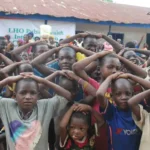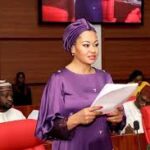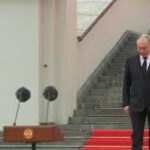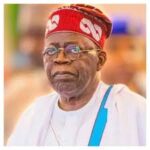[ad_1]
Samuel Akpobome Orovwuje canvasses leadership with vision to actualise the country’s development agenda
“Those who do not move do not notice their chains”
– Rosa Luxemburg
Years of military rule and political chaos have caused Nigerians to be trapped in the wasteland of inept leadership. The unevenness in authentic public leadership continues to flourish, leaving us with no remarkable evolvement in our nation-building efforts. This is the judgment of Nigeria!
Over the years, Nigerians have hardly paid attention to the relationship between generational political mismatch, the organisation of political parties, authentic leadership recruitment and credible representation at the various levels of governance. As we approach the 2023 general elections, citizens must remember that Nigeria’s advancement and success start with the selective recruitment of appropriate leaders. Therefore, for collective responsibility of such importance, much effort is required to consider leaders with a long-term vision and mission in order to actualise Nigeria’s development agenda.
This article aims to provoke conversation on the new awakening in order to ascertain the effects that political party systems and recruitment have on the kinds of men and women who enter public life, as well as the policies they espouse. It further interrogates the disconnect among the four generations, political illiteracy and contradictions in our internal democracy, the lack of clear ideology and structural weaknesses in party organisation vis-à-vis the final outcome of those who become public leaders.
Today, empowered interest groups, particularly citizens, shape the outcome of credible leaders. The connections too often overlooked in the rush to the 2023 general elections and previous ones are the need to communicate across Nigeria’s Four Generations, the question of political illiteracy amongst voters, the unreasonable messaging of the treacherous and uncaring political class across the divide to undermine genuine nation-building efforts.
Unequivocally, four distinct generations are found across the continuum, and understanding this generational clash of interest is very important to citizens’ decision-making process in electing credible leaders. The Traditional Generation (also known as the Silent Generation) refers to those born between 1900 and 1945, who are supposed to be retired. They are often referred to as the “cabal” or “owners” of Nigeria. Many of them are involved in or re-entering politics in order to maintain their hold on illicit wealth. In my view, they do not mean well for the country.
The second generation, and the most critical, is the Baby Boomer Generation. They are those born between 1946 and 1964, and they make up the largest segment of the political class (moneybags). They manipulate the process with their godfathers (the Traditional Generation) to perpetuate themselves in power, deploying a high dose of religious, ethnic and primordial sentiments to hoodwink Nigerians. Going forward, citizens must understand the dynamics of negative political elite power play so as to forge a new consciousness.
The next is Generation X, those born from 1965 through the 1980s, and they are the smallest segment of the Nigerian society. Nevertheless, they make up today’s bulk of senior management positions, entrepreneurs, senior public servants (military and bureaucrats), and they represent the majority of rent-seekers and the corrupt in collaboration with the Baby Boomer Generation. They are wired with military outcropping and command management style to manipulate the system for their personal gain above the public good.
The youngest and most critical group is the Millennial Generation, or Generation Y, referring to those born in the 1990s and 2000s. This generation is both the most controversial and the leading light of the four generations. The millennials are technologically savvy, extremely confident, demanding and multidimensional in outlook, and they embrace social cohesion.
Understanding the distinguishing characteristics and clash points of each generation is critical to forging a new leadership template. We must be intentional about projecting leaders that can take on tougher assignments and successfully deliver on the task at hand. The presidential candidates in particular must demonstrate fine quality on issues of evidence-based national development policy. They must also portray uncommon competence, courage, compassion and capacity to resolve the national question, find workable and durable solutions to Nigeria’s security challenges and strengthen institutional capacities to sustain peace and democracy.
The national debate on evolving credible leadership must go beyond the rhetoric of empty promises, and the pathway, going forward, must revolve around sustainable development ecosystems and evidence-based policy templates, which must include development management, economics and rural development, the environment, poverty reduction, conflict and reconstruction, social policy and social development.
Nigerians cannot afford to underestimate the power of the treacherous political elite to lobby themselves into power again by all means possible. However, like previous elections, it should be considered a challenge, not an insurmountable obstacle, in electing a credible leader. The challenges of mass mobilisation, national spread and organisational capacity will be germane to rescuing Nigeria. Nevertheless, citizens have to revive the required drive to build a coalition of like-minds.
Sadly, with each episodic election cycle, voter attendance is becoming appallingly low and worrisome. A number of explanations have been given for this, including voter indifference (due to lack of confidence in the electoral process), insufficient civic education and poor leadership recruitment ecosystem, among other factors. The trend from 1999 to date is abysmal and worrisome. According to INEC, registered voters stood at 57.9 million in 1999, with only 30.3 million (52.3 %) voter turnout; in 2003, 60.8 million with 42.0 million (69.1%) voter turnout; in 2007, 61.6 million with 35.4 million (57.5%) voter turnout; in 2011, 73.5 million with 39.5 million (53.7%) voter turnout; in 2015, 67.4 million with 29.4 (43.7%) voter turnout; in 2019, 82.3 million voters with 28.6 million (35.6%) voter turnout.
Citizens must instill credibility and trust in the political process by voting. Let us start now by weeding out those without good intentions to set the template for a credible leadership evolution.
Lastly, the tyranny of political parties’ godfatherism must be dismantled, while the military management style and chain command of “do as I say, do not ask why” mentality must stop. The current scheme of things should provoke a bottom-up, citizen-led voting drive to elect authentic leaders. Empowering, informing and educating citizens so that they take action through a well-informed voting culture and change the narrative through collaboration, peer-to-peer and word-of-mouth campaign strategy will provide an edge in the 2023 general elections.
[ad_2]
Source link









